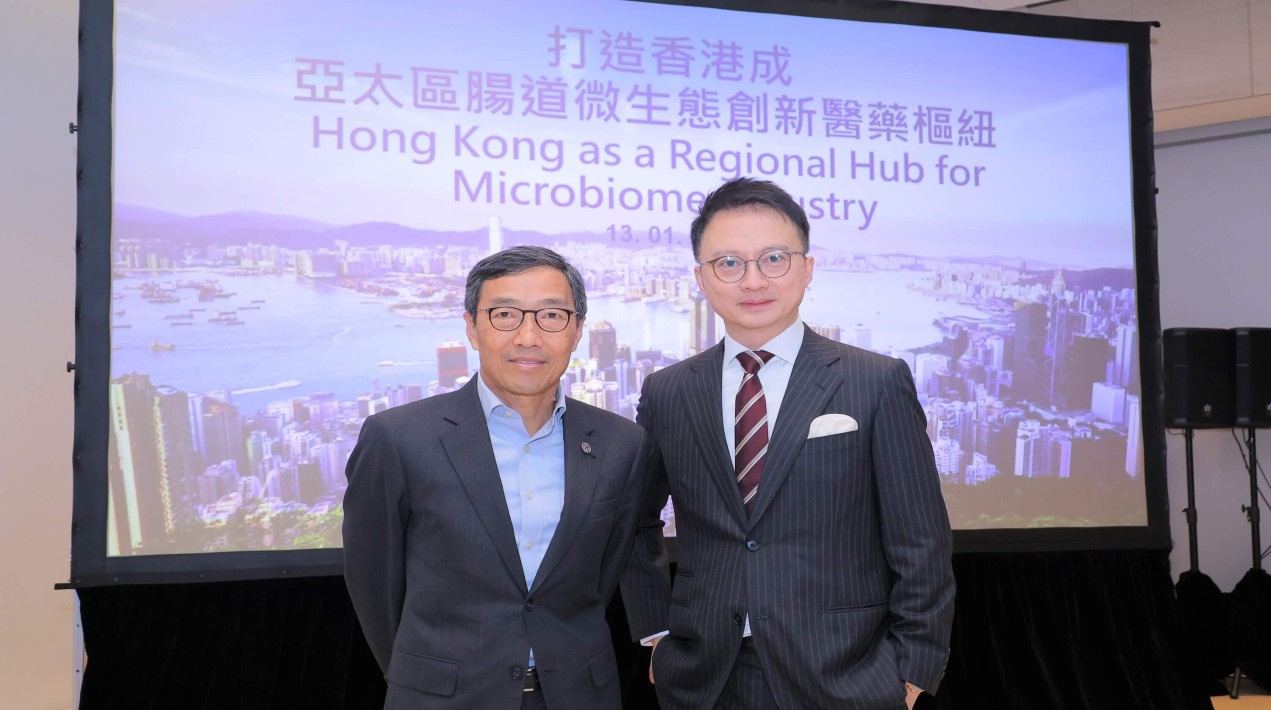
The Faculty of Medicine of The Chinese University of Hong Kong (CU Medicine), Microbiota I-Center (MagIC), and Hong Kong Science and Technology Parks Corporation (HKSTP) partnered to hold the Microbiome Summit 2023 (the Summit) at Hong Kong Science Park recently.
Over 20 highly-respected international academics and pharmaceutical industry partners discussed the uses of gut microbiome and highlighted the potential for Hong Kong to become a hub for “microbiome industry” innovation and technology in the Asia-Pacific region.
The human gut is often referred to as the “second brain” because it contains more neurons than the spinal cord. The neurotransmitters produced by gut bacteria play a significant role in not only digestion but also various health conditions such as immunity, allergies, obesity, colon cancer, autism, depression, and dementia.
Recent advancements in biotechnology have led to the successful use of gut microbiomes in various important clinical conditions. For instance, the US Food and Drug Administration (FDA) has approved the use of an oral formulation of gut microbiome for the treatment of Clostridium difficile infection, a recurrent and potentially fatal condition.
At CUHK, the first-ever diagnostic test for early colorectal cancer and recurrent colorectal adenomas based on microbiome has been commercialised. CUHK envisions that with advancements in biotechnology, it will be possible to isolate next-generation probiotic bacteria with specific health benefits for the treatment of conditions such as colorectal cancer, diabetes, obesity, autism, and dementia.
CU Medicine innovates clinical applications of gut microbiome
CU Medicine is a global leader in gut microbiome research. The Microbiota I-Centre (MagIC) is an international centre of excellence located in the Hong Kong Science Park, working closely with the Hong Kong Science and Technology Parks Corporation (HKSTP) and its biomedical ecosystem to advance relevant translational research.
CU Medicine is the only faecal microbiota transplantation (FMT) centre in Asia that has received recognition from the United Kingdom. It has already performed a high volume of FMTs which is equivalent to one-third of all FMTs performed in Europe. Over the last twenty years, CUHK Medicine has developed several non-invasive diagnostic cancer tests that have been approved by the National Medical Products Administration (NMPA) for use on the mainland.
Other non-invasive diagnostic tests in the research team’s pipeline include autism, long-covid and Crohn’s disease. Since 2019, the team has established a network of hospitals in Mainland China to collect the world’s largest cohort of 100,000 maternal and foetal samples to enable a better understanding of how early-life gut microbiome influences health outcomes.
Developing HK into a regional hub for the microbiome industry
The Dean of CU Medicine stated that Hong Kong is well-positioned to become a regional hub for the microbiome industry, with its world-class researchers, advanced technology, and strong intellectual property protection. The microbiome market is expected to experience a compound annual growth rate (CAGR) of 30-40% per year.
The government is urged to simplify the regulatory approval process for innovations in the Greater Bay Area. Specifically, it was suggested that a regional office of the National Medical Products Administration (NMPA) be created to accelerate the approval of innovations for use in the Greater Bay Area. This is expected to be an effective way to attract pharmaceutical companies and talent, and help Hong Kong become a new hub for pharmaceutical innovation.
The HKSAR government recently released the ‘Hong Kong Innovation and Technology Development Blueprint’, which proposes strategies in terms of land, talent, and capital. It advocates the establishment a modern version of ‘Noah’s Ark’ to process and store gut microbiome biosamples in the Loop Area.
The CEO of HKSTP stated that the Park has been partnering with stakeholders from the government, industry, academic and research sectors to provide I&T talents with comprehensive ecosystem support for translational research in the healthcare landscape, from bench to bedside, to benefit society.
Over the past five years, the number of biomedical companies in Science Park has grown from 50 to approximately 180, reflecting the continued strong growth of the biomedical technology sector.
The 14th Five-Year Plan and the HKSAR Government’s Hong Kong Innovation and Technology Development Blueprint will help more I&T enterprises “go global” and solidify Hong Kong’s role as a bridge connecting mainland China and the world.
















